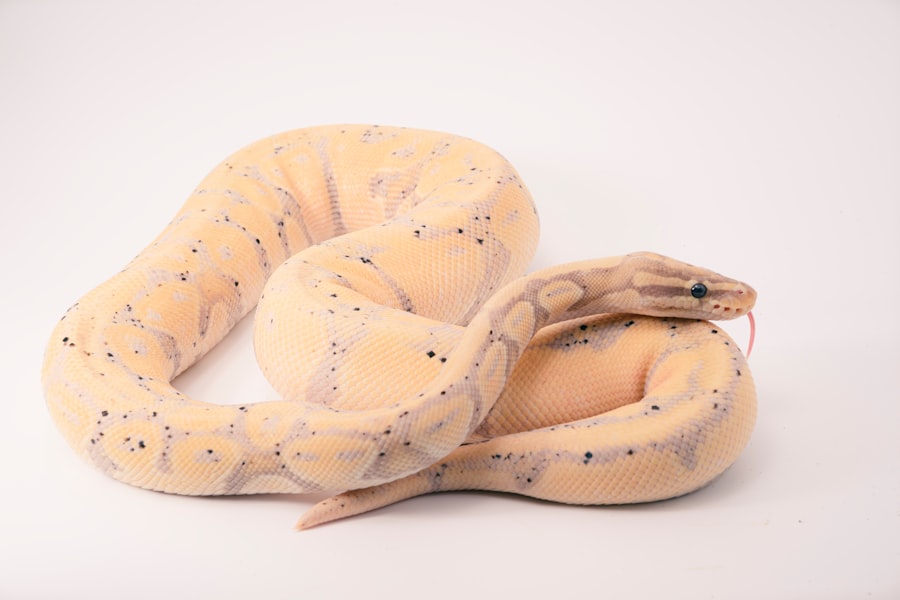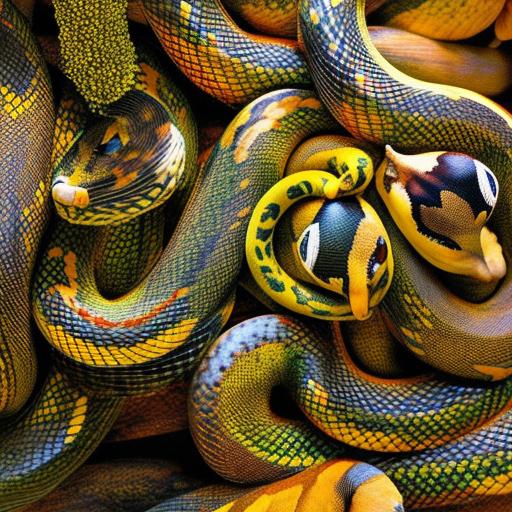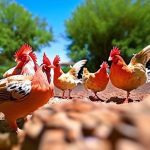Snakes and chickens are two creatures that often find themselves in close proximity to each other. While snakes play an important role in the ecosystem, they can pose a threat to chickens and their safety. It is crucial for chicken owners to be aware of the potential dangers that snakes can bring and take necessary measures to protect their flock.
Keeping chickens safe from snakes is of utmost importance for several reasons. Firstly, snakes can harm chickens in various ways, including through predation and the spread of diseases. Secondly, snake bites can be fatal to chickens, leading to serious health issues or even death. Therefore, it is essential for chicken owners to understand the threat that snakes pose and take appropriate actions to ensure the safety of their flock.
Key Takeaways
- Snakes pose a serious threat to chickens and can cause significant harm or death.
- Common types of snakes that pose a threat to chickens include rat snakes, king snakes, and copperheads.
- Signs of snake presence near the chicken coop include shed skins, droppings, and egg shells with small holes.
- Natural ways to keep snakes away from the coop include using essential oils, planting certain herbs, and keeping the area clean and free of debris.
- Physical barriers such as hardware cloth and snake-proof fencing can be effective in preventing snakes from entering the coop.
Understanding the threat of snakes to chickens
Snakes can harm chickens in several ways. Firstly, they are natural predators and can prey on chickens, especially young ones or those that are smaller in size. Snakes have the ability to swallow prey whole, making them a formidable threat to chickens. Additionally, snakes can also spread diseases to chickens through their saliva or feces. These diseases can weaken the immune system of chickens and make them more susceptible to other illnesses.
One of the most significant dangers that snakes pose to chickens is snake bites. Snake bites can be fatal to chickens if left untreated. The venom injected by snakes can cause severe tissue damage, internal bleeding, and organ failure. Chickens that survive snake bites may suffer from long-term health issues or reduced egg production. Therefore, it is crucial for chicken owners to be aware of the potential dangers of snake bites and take necessary precautions to prevent them.
Types of snakes that pose a threat to chickens
Several types of snakes pose a threat to chickens. The most common ones include rat snakes, garter snakes, king snakes, and copperheads. Rat snakes are non-venomous constrictors that are known for their ability to climb trees and enter chicken coops. They are opportunistic predators and can prey on chickens, eggs, and chicks. Garter snakes are also non-venomous and are commonly found near water sources. While they primarily feed on insects and small vertebrates, they can pose a threat to chickens if they come into close contact.
King snakes are another type of non-venomous snake that can harm chickens. They are known for their ability to kill and consume other snakes, including venomous ones. While king snakes may not directly target chickens, their presence near the coop can still cause stress and anxiety among the flock. Copperheads, on the other hand, are venomous snakes that can be found in various regions. Their venom can cause severe health issues or even death in chickens if bitten.
Signs that snakes are present near the chicken coop
It is important for chicken owners to be able to identify signs of snake presence near the chicken coop. One of the most common signs is shed snake skin. Snakes shed their skin periodically as they grow, leaving behind a translucent and scaly skin. Finding shed snake skin near the coop is a clear indication that snakes have been in the area.
Another sign of snake presence is snake tracks or trails. Snakes leave distinctive tracks in soft soil or dust, which can be identified by their S-shaped pattern. Additionally, snake droppings can also be found near the coop. Snake droppings are usually cylindrical in shape and may contain remnants of prey such as feathers or eggshells.
Being aware of these signs is crucial for chicken owners as it allows them to take necessary actions to prevent snake infestations and protect their flock. Regular monitoring of the coop area and immediate response to any signs of snake presence can help ensure the safety of chickens.
Natural ways to keep snakes away from the chicken coop
There are several natural methods that can be used to keep snakes away from the chicken coop. One effective method is to keep the coop area clean and free of debris. Snakes are attracted to areas with hiding spots, so removing any potential hiding places such as piles of wood or rocks can discourage them from entering the coop.
Another natural method is to use certain plants that repel snakes. Plants such as marigolds, lemongrass, and wormwood are known to have repellent properties against snakes. Planting these around the coop or using their essential oils can help deter snakes from approaching.
Additionally, introducing natural predators of snakes can also be an effective way to keep them away from the coop. Animals such as cats, dogs, or even certain bird species like guinea fowls are known to prey on snakes. Having these animals around the coop can create a deterrent for snakes and reduce the risk of infestation.
Using physical barriers to prevent snakes from entering the coop

Physical barriers are an important aspect of snake prevention in chicken coops. One effective barrier is a hardware cloth or mesh wire fence. This type of fence should be buried at least 6 inches into the ground and extend at least 2 feet above ground level to prevent snakes from burrowing under or climbing over it.
Another physical barrier that can be used is a snake-proof coop design. This includes ensuring that there are no gaps or openings in the coop that snakes can squeeze through. Installing tight-fitting doors and windows, as well as sealing any cracks or holes, can help prevent snakes from entering the coop.
Chemical repellents for snakes
Chemical repellents can also be used to deter snakes from approaching the chicken coop. One commonly used chemical repellent is sulfur. Snakes have a strong aversion to sulfur and will avoid areas where it is present. Sprinkling sulfur powder around the perimeter of the coop or using sulfur-based products can help keep snakes away.
Another chemical repellent is naphthalene, which is commonly found in mothballs. Snakes dislike the strong smell of naphthalene and will avoid areas where it is present. Placing mothballs around the coop or using naphthalene-based products can be an effective way to repel snakes.
The role of chicken coop design in preventing snake infestations
The design of the chicken coop plays a crucial role in preventing snake infestations. A well-designed coop should have solid walls and a secure roof to prevent snakes from entering. Additionally, all openings such as windows and vents should be covered with mesh wire to keep snakes out.
It is also important to consider the location of the coop. Placing the coop on a raised platform or foundation can help prevent snakes from burrowing underneath. Additionally, ensuring that the coop is located away from areas with dense vegetation or water sources can reduce the likelihood of snake encounters.
Best practices for maintaining a snake-free chicken coop
Maintaining a snake-free chicken coop requires regular maintenance and vigilance. One important practice is to regularly inspect the coop for any signs of snake presence or potential entry points. Any gaps or openings should be promptly sealed to prevent snakes from entering.
Keeping the coop area clean and free of debris is also crucial. Regularly removing any piles of wood, rocks, or other potential hiding spots can discourage snakes from approaching. Additionally, keeping the grass around the coop area short can reduce the likelihood of snakes hiding in tall vegetation.
Regularly monitoring the flock for any signs of distress or illness is also important. If a snake is spotted near the coop or if a chicken shows signs of a snake bite, immediate action should be taken to remove the snake and provide necessary medical attention to the affected chicken.
Keeping your chickens safe from snakes
In conclusion, keeping chickens safe from snakes is essential for their well-being and overall safety. Snakes can harm chickens through predation, the spread of diseases, and snake bites. Understanding the threat that snakes pose and taking necessary precautions can help ensure the safety of the flock.
Identifying signs of snake presence near the coop, using natural methods to repel snakes, and implementing physical barriers are effective ways to prevent snake infestations. Additionally, chemical repellents and proper chicken coop design can further enhance snake prevention efforts. Regular maintenance and vigilance are key in maintaining a snake-free chicken coop.
By taking these steps and being proactive in protecting chickens from snakes, chicken owners can create a safe and secure environment for their flock.
If you’re looking for the best way to keep snakes away from your chickens, you might also be interested in learning about the mating season for turkeys. Understanding the breeding patterns and behaviors of turkeys can help you create a more secure environment for your poultry. Check out this informative article on Poultry Wizard to gain valuable insights into turkey mating season and how it can impact your chicken’s safety.
FAQs
What are the common types of snakes that pose a threat to chickens?
The most common types of snakes that pose a threat to chickens are rat snakes, black snakes, and copperheads.
What are the signs that snakes are present in the chicken coop?
The signs that snakes are present in the chicken coop include missing eggs, droppings, and feathers, as well as shed snake skins and snake tracks.
What are the best ways to keep snakes away from chickens?
The best ways to keep snakes away from chickens include keeping the coop clean and free of debris, sealing all entry points, using snake repellents, and keeping the area around the coop free of tall grass and brush.
What are some natural snake repellents?
Some natural snake repellents include cinnamon oil, clove oil, and cedar oil. These oils can be mixed with water and sprayed around the coop to repel snakes.
What should I do if I find a snake in the chicken coop?
If you find a snake in the chicken coop, it is important to remove it immediately. You can use a snake hook or tongs to safely remove the snake and release it into a nearby wooded area.
Meet Walter, the feathered-friend fanatic of Florida! Nestled in the sunshine state, Walter struts through life with his feathered companions, clucking his way to happiness. With a coop that’s fancier than a five-star hotel, he’s the Don Juan of the chicken world. When he’s not teaching his hens to do the cha-cha, you’ll find him in a heated debate with his prized rooster, Sir Clucks-a-Lot. Walter’s poultry passion is no yolk; he’s the sunny-side-up guy you never knew you needed in your flock of friends!







